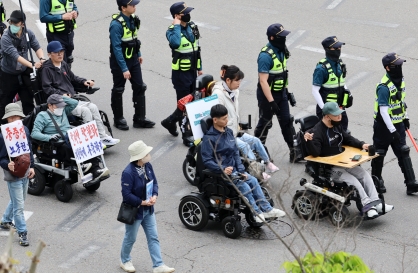South Korean stocks are expected to bounce between small rises and falls this week, paring gains from a nine-week high rally, amid continuing jitters over a weaker yen and U.S. spending cuts, analysts said.
The benchmark Korea Composite Stock Price Index closed up 30.28 points, or 1.55 percent, to 1,981.18 on Friday, the biggest weekly gain since Dec. 14 last year.
The statement from developed nations on Tuesday warning about Tokyo’s competitive currency devaluation partly stemmed concerns over the rapid descent of the Japanese yen, which has hurt Korean exports, and caused the main stock index to rebound.
Foreigners came back, with a combined net buying of 325 billion won ($301.2 million) for the week, indicating the impact from the benchmark change by U.S. Vanguard Inc. has diminished.
The world’s No. 2 fund manager shifted its benchmark index to the Financial Times Stock Exchange from Morgan Stanley Capital International in January, prompting a big foreign outflow from the local stock market as the FTSE tracks fewer Korean stocks and thus the firm has to reduce its portion in the basket.
Analysts forecast the new central bank chief in Japan, who’s likely to be appointed next week, and the U.S. renegotiation on its fiscal budget cut can weigh down the Seoul bourse in the short term.
“The decision on the new central bank chief can prompt the yen’s depreciation and any hurdles over the sequester talks may keep the market from seeking upward moves,” said Lee Seung-woo, a KDB Daewoo Securities Co. analyst.
The Seoul market will thus likely pare gains, fluctuating in a tight range, depending on how events abroad turn out for the local economy, Lee added.
This week, the U.S. is set to release its housing data, with Japan to report its trade balance. Both sets of data are estimated to have fared better.
For last week, the KOSPI saw most sectors gather ground across the board, with steelmakers rising 2.9 percent and chemical shares climbing 2.8 percent. But telecom and utility issues finished bearish with 4 percent and 0.2 percent, respectively. (Yonhap News)
The benchmark Korea Composite Stock Price Index closed up 30.28 points, or 1.55 percent, to 1,981.18 on Friday, the biggest weekly gain since Dec. 14 last year.
The statement from developed nations on Tuesday warning about Tokyo’s competitive currency devaluation partly stemmed concerns over the rapid descent of the Japanese yen, which has hurt Korean exports, and caused the main stock index to rebound.
Foreigners came back, with a combined net buying of 325 billion won ($301.2 million) for the week, indicating the impact from the benchmark change by U.S. Vanguard Inc. has diminished.
The world’s No. 2 fund manager shifted its benchmark index to the Financial Times Stock Exchange from Morgan Stanley Capital International in January, prompting a big foreign outflow from the local stock market as the FTSE tracks fewer Korean stocks and thus the firm has to reduce its portion in the basket.
Analysts forecast the new central bank chief in Japan, who’s likely to be appointed next week, and the U.S. renegotiation on its fiscal budget cut can weigh down the Seoul bourse in the short term.
“The decision on the new central bank chief can prompt the yen’s depreciation and any hurdles over the sequester talks may keep the market from seeking upward moves,” said Lee Seung-woo, a KDB Daewoo Securities Co. analyst.
The Seoul market will thus likely pare gains, fluctuating in a tight range, depending on how events abroad turn out for the local economy, Lee added.
This week, the U.S. is set to release its housing data, with Japan to report its trade balance. Both sets of data are estimated to have fared better.
For last week, the KOSPI saw most sectors gather ground across the board, with steelmakers rising 2.9 percent and chemical shares climbing 2.8 percent. But telecom and utility issues finished bearish with 4 percent and 0.2 percent, respectively. (Yonhap News)
-
Articles by Korea Herald



















